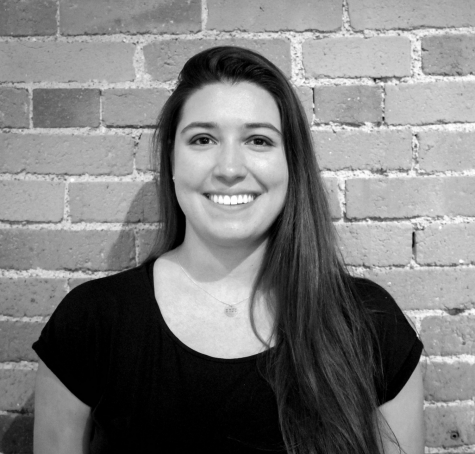High schoolers attend 9th annual Ethics Symposium
March 19, 2019
March 5 marked the 9th Annual Rotary Club of Erie Ethics Symposium at Mercyhurst University hosted by the Evelyn Lincoln Institute for Ethics in Society (ELIES) and the Rotary Club of Erie.
Approximately 80-100 students from Erie high schools came to Mercyhurst to partake in a day to discuss what ethics is and why it should matter to them.
“The panels and lectures of ELIES try to address the ethical questions and challenges that students will face in their personal, public and professional life,” associate Religious Studies professor and co-director of ELIES, Verna Ehret, Ph. D., said. “We want to use this symposium to expand this into the high schools to engage in conversations in ways that are age-appropriate, but also to stimulate thinking about their own moral compass and how they want to engage with the world.”
The ELIES was founded 10 years ago by Daniel McFee, department chair of Religious Studies at Mercyhurst North East and current co-director of ELIES and Kevin Sullivan, Ph. D., associate Philosophy professor. The pair talked to the local Rotary Club to figure out how institutions can better promote ethics with the youth of the community. Rich McCarty, Ph. D., associate professor of religious studies, was brought on board the project nine years ago as university liaison with the Rotary Club.
“We have to keep reminding people that ethics is not just our gut opinions about anything, what we’ve been told to believe or even partisan positions,” McCarty said. “Instead, ethics requires critical reflection on the moral realm by which we give and demand reasons for holding the positions that we do.”
Last year, the symposium grew close to 250 students including several guest from the community as well as Rotarians and others from out of state. While McCarty is proud of the success of the symposium and wanted the program to grow to a regional event, this year it was scaled down in order to remain a sustainable program for Erie.
The intention for the symposium is to become a way to reach the youth of Erie through more than just one-day events. Ehret led a teacher training session during the day in hopes of supporting ethics clubs, such as Rotary’s “Interact,” in local high schools and to give valuable information on how to continue building ethics education.
This year, the day included presentations from McCarty and Ehret as well as Mercyhurst alumnus Nick Cianci and Erie Mayor Joe Schember. Having speakers from the community emphasized the importance of resources such as this for the youth of Erie in order to build up a stronger community. The students participated in large and small group discussions and also watched a performance titled “Choices” by a group of thespians from Gannon University.
“It’s a really nice way to bring students on to campus to give them a sense of what it means to actually wrestle with these questions,” Ehret said.
The sophomores and juniors were challenged to think about ethics from non-religious perspectives using the Rotary International Four-Way Test. The Four-Way Test helps one to determine the ethical nature of the things we think, say and do through four questions: I. Is it the truth? II. Is it fair to all concerned? III. Will it build goodwill and better friendships? IV. Will it be beneficial to all concerned?
Sullivan, Greg Baker, Ph.D, vice president of Mission Integration, Lee Belovarac, MBA, associate Business professor, Alice Edwards, Ph. D., professor of Spanish and Matthew Weaver, Ph. D., associate professor of Psychology, made up the team of Mercyhurst faculty that helped moderate breakout sessions during the day alongside the Rotarians.
“I was very impressed by the caliber of the high school students who attended,” Belovarac said. “They were thoughtful and engaged in our small group discussion. I was also concerned to hear from them about the amount of bullying, both in person and per social media, that goes on in their schools.”
Weaver’s breakout session also discussed bullying in schools and how kids are concerned about their reputation when doing the right thing. He was impressed by the way the students used the Four-Way Test to work together in talking about difficult issues.
“I could tell that students have already discussed some of these things in their high school classes,” Weaver said. “I think it helped them solidify some ideas and things that had been started in other places. They are able to interact with their peers to see how they have dealt with these issues in the past.”
McCarty stated that ethics may be thought of as a soft discipline, but emphasizes that ethicists are trained with years of a rigorous moral and theoretical background.
“If we can get people from high school age on to respect that ethics is a serious discipline, that learning about ethics can help them with their life, we would start to try to identify people that we can trust with those who are ethicists,” McCarty said.
The Ethics Symposium supports Mercyhurst’s mission and dedication to ethical thinking about difficult issues.
“The mission is scripted here in such a way that I think anybody, regardless of religious or philosophical tradition, can participate in that mission. The way to do that is to care about ethics,” McCarty said.
Weaver echoes the importance of ethics at Mercyhurst and the high caliber of ethical thinkers the university employs.
“You don’t really end up at a liberal arts Catholic institution that values ethics so highly unless you value that as well,” Weaver said. “We attract a type of faculty that values those types of things and it is clearly something we value as an institution and as faculty.”
McCarty, Ehret and all those involved saw the day ultimately as a great success and hope to continue the work for ethics education in the community in years to come.

